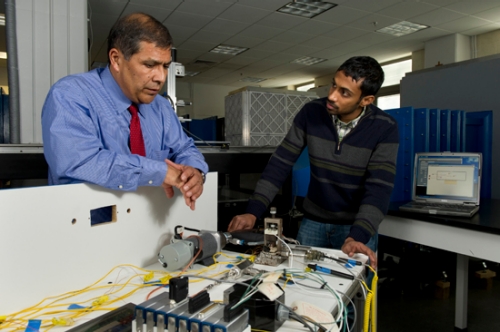College Helps Launch Historic Industry/ University Cooperative Research Center for “Greener” Data Centers
In today’s digital-driven society, keeping the data flow that controls everything from our financial markets to homeland security running smoothly and unimpeded is not merely a convenience, it is crucial. Villanova University’s College of Engineering, in collaboration with a consortium of four other universities and four area corporate partners, has been chosen as the joint recipient of a five-year, $3.4 million dollar National Science Foundation (NSF) grant to establish an Industry/University Cooperative Research Center in Energy-Efficient Electronic Systems (IUCRC E3S).
The grant is the first of its kind funded by the NSF in this emerging research area. Villanova’s initial corporate partners include Verizon Wireless, Comcast, Steel Orca, a green-energy data center provider located in Newtown, Pennsylvania, and Delaware Valley Liebert (DVL), a data center services subsidiary of Emerson. University partners include Binghamton University, the overall lead institution, and the University of Texas at Arlington. In addition, Georgia Tech is a collaborating university.
“Data centers are in essence a different kind of office building. They don’t house people, they house electronic machines that perform information technology functions while dissipating huge amounts of heat,” says Alfonso Ortega, Villanova College of Engineering’s associate dean for graduate studies and research, the James R. Birle Professor of Energy Technology, and the director of the Villanova portion of the new E3S center
“As with other types of buildings, a large emphasis is now placed on efficient utilization of energy in data centers. Energy can be better utilized by altering the methods used to perform electronic functions by holistically designing the physical structure of the data center and its subsystems, the dynamic allocation of computing resources, and the systems that provide cooling and environmental control. Considering the reutilization of waste energy that currently is discharged from data centers and put to no good use is another important consideration” Ortega added.

The goal of research conducted by the E3S center is to develop innovations that will make data centers, which consume three percent of all the electricity generated in the United States (enough energy to power a couple of good-sized cities for most of the year), efficient and sustainable. The research center’s holistic approach to energy efficiency development – linking the fields of information technology, telecommunications, electronic systems and cooling equipment – could translate into millions of dollars in savings and a much “greener” industry.
A total of 15 American companies representing the entire supply chain from hardware manufacture and software developers to end-users have signed on as members providing the primary support for work on projects of mutual interest. In addition to Verizon and Comcast, the list includes industry leaders such as Microsoft, Bloomberg, General Electric, Corning, Interconnect Technologies and Emerson Network Power.
The exponential demand for data storage arising from the explosive growth in mandated record keeping, faster financial transactions, electronic storage of medical data, internet commerce, social media sites, and a host of other uses have resulted in rapid expansion of data centers.
Finding energy savings opportunities requires innovative approaches, according to Verizon Wireless Director of Engineering and Operations Support Richard Craig.
“Through our partnership with Villanova’s College of Engineering on the new Industry/University Cooperative Research Program for energy-efficient data centers, Verizon Wireless sees an opportunity to test the limits of technology in a lab environment while developing and leveraging the talents of future leaders in this very important and highly competitive field,” Craig commented.
“Our participation in the National Science Foundation and Villanova’s grant program is extremely exciting,” Dave Crocker, CEO of Steel Orca commented.
“Our goal is to provide a dual platform for researchers to use our digital utility center (DUC) labs to innovate, test, and prove theory. We are also pleased to provide a production theatre for commercial applications consequent to the work done in the lab,” he added.
The E3S center’s initial focus will be on finding ways to allow electronic systems to monitor and self-regulate the amount of energy they use. Lessons learned from reducing energy consumption in data centers will offer solutions to practical energy consumption problems in all areas of the electronics industry – from cell phones and tablets to gaming consoles and e-commerce.
Ortega and the Villanova research team want to find ways to reuse the tremendous volume of wasted energy that is generated as a by-product of the cooling process of the heat-generating equipment which processes and stores vast quantities of data. The group is investigating innovative, nontraditional ways to utilize waste energy that is more sustainable and environmentally-friendly. The team is focusing on developing models that will help in the decision process when designing future liquid-cooled systems as opposed to air-cooled systems.
In addition to providing solutions to some of today’s most challenging energy-efficiency problems, E3S also looks to the future in providing valuable industry-relevant training opportunities for undergraduate and graduate students.
”The E3S Center provides a rich opportunity for training graduate students in the rapidly growing College of Engineering Ph.D. program, as well as masters and undergraduate student researchers,” says Ortega. "The Center will also provide opportunities for inter-university student and faculty exchange," he added.
Members of the Villanova College of Engineering faculty that will participate in the IUCRC include Ortega, the center director, and co-Principal Investigators Gerard Jones, professor and associate dean for academic affairs, department of mechanical engineering; Amy Fleischer, associate professor, mechanical engineering; Aaron Wemhoff, assistant professor, mechanical engineering and Kamran Fouladi, adjunct professor.
